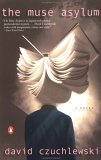Summary | Excerpt | Reviews | Readalikes | Genres & Themes | Author Bio

Critics' Opinion:
Readers' Opinion:
First Published:
May 2001, 240 pages
Paperback:
Apr 2002, 240 pages
Chapter 2
I have no memory of the days I first learned about music, language or the sea. But I remember discovering Horace Jacob Little.
A stray paperback, overstocked or misordered, fell into the possession of my high school English teacher. Recognizing nothing of what would come of it, she gave me this copy of The Unreal City, Horace Jacob Little’s early masterpiece of love and betrayal. It did not look promising to me. Of the book’s six hundred pages, the first twenty provided a detailed history and geography of its fictional setting. At the time I was a fan of books in which vampires have killed several people by page twenty. Worst of all, the cover was blank except for the title and the author’s name. It looked unfinished--something long and tedious that the publisher simply gave up on and sent out without bothering to commission artwork.
I let the book sit around before boredom drove me to pick it up on an idle weekend. I read it straight through, over the course of twenty-three exhausting hours. Never before had a novel burdened me with the anxiety of participating in a tragedy. The death scene in the final chapter struck me with the force of revelation. As I read the last paragraph, I cried silently--whether from sadness or exhilaration, I did not know. I had stumbled unprepared into a more troubling understanding of the world. The pain and doubt that ran throughout The Unreal City were promises of what I would find in my own future, but the prose was so beautiful and the story so fascinating that I was grateful for the appalling knowledge. Horace Jacob Little’s book was an incantation that dispelled the calm certainties of my childhood.
I soon made my way through every Horace Jacob Little book. His work staked out for itself a corner in my consciousness. I inscribed my name carefully on the inside of the covers: JAKE BURNETT. My world took on shades of Horace Jacob Little’s fictions. I adored him with the reverence for a writer that only a high school senior could muster.
My own enthusiasm aside, Horace Jacob Little was more talked about than read. He was most famous for the strange circumstances of his personality, for his seclusion, his solitude. He was not much more than a fiction himself. His true identity was a mystery. Legend had it that not even his agent had met him, that they communicated via post office box. Horace Jacob Little had insisted on blank covers for all his books. No illustrations, no capsule biographies, no author photographs, no laudatory blurbs. He had never granted an interview. No one knew what he looked like or where he lived. He was less a person than an anonymous evangelist, holed up somewhere, writing words as a greater spirit moved him. I used to imagine him: a death-row inmate, a mild-mannered accountant, a disfigured cripple. . .
He was none of these, as it turned out, nothing my imagination could conjure.
In contrast to his first books, Horace Jacob Little’s later work was experimental and difficult, filled with allusions and bursts of madcap, sometimes barely intelligible prose. Many people preferred the later books, such as Strange Meeting, which were certainly more celebrated. To me, however, his best work was his earliest. Take, for instance, the title story from his 1974 collection, The Length of New Jersey.
A man on a train is startled from a daydream by a pat on the head. A mother and her young child are sitting behind him, and the man has been listening to her narrate the journey to the child: "Look at the river and all the ice." "Look at the girl playing basketball--do you see the girl?" To all these questions the child responds with preverbal noise, seemingly just on the verge of recognizable words. The pat on the man’s head draws a gentle rebuke from the mother: "Don’t hit the man on the head, that’s not nice." The man half turns and smiles at the mother to let her know he is not offended.
Copyright 2001 David Czuchlewski. All rights reserved. No part of this book may be reproduced without the written permission of the publisher, Putnam Books.





The House on Biscayne Bay
by Chanel Cleeton
As death stalks a gothic mansion in Miami, the lives of two women intertwine as the past and present collide.

The Flower Sisters
by Michelle Collins Anderson
From the new Fannie Flagg of the Ozarks, a richly-woven story of family, forgiveness, and reinvention.

The Funeral Cryer by Wenyan Lu
Debut novelist Wenyan Lu brings us this witty yet profound story about one woman's midlife reawakening in contemporary rural China.
Your guide toexceptional books
BookBrowse seeks out and recommends the best in contemporary fiction and nonfiction—books that not only engage and entertain but also deepen our understanding of ourselves and the world around us.